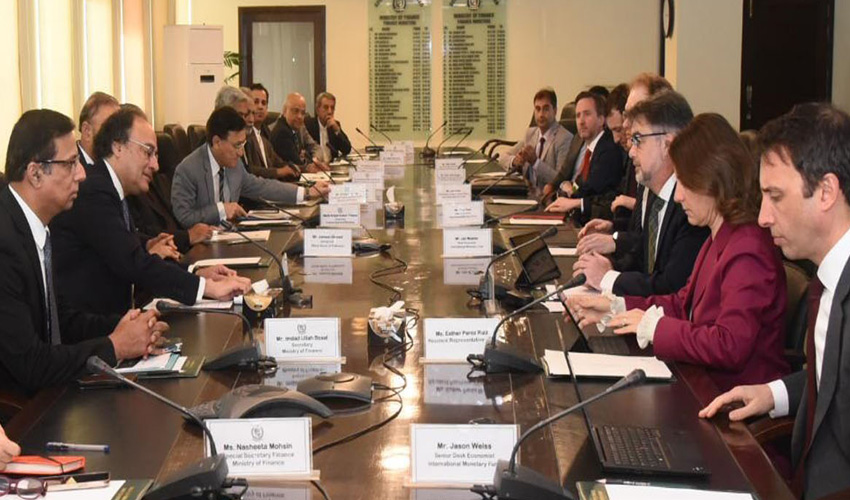Prime Minister Shehbaz Sharif-led Pakistani government on Monday commenced discussions with a visiting delegation from the International Monetary Fund (IMF) over another new and "larger" loan programme.
This significant move comes as Pakistan endeavours to secure a more extensive and enduring financial agreement subsequent to the successful completion of a $3 billion Stand-By Arrangement (SBA) last month.
Federal Minister for Finance and Revenue, Muhammad Aurangzeb, convened with the IMF mission, led by Chief Nathan Porter as disclosed in a statement from the Finance Division.
During the meeting, Minister Aurangzeb highlighted the notable enhancements in the country's macro-economic indicators throughout the SBA period and reiterated the government's unwavering commitment to advancing and amplifying the reform agenda.
Attended by dignitaries including State Bank of Pakistan Governor Jameel Ahmed and the Chairman of the Federal Board of Revenue, the discussions underscored Pakistan's aspirations for a broader economic stabilization framework.
Pakistan's aspiration for an extended and more substantial Extended Fund Facility under the IMF program to fortify macroeconomic stability has gained momentum.
With the recent receipt of $1.1 billion in the final tranche of the SBA, Prime Minister Shehbaz underscored the pivotal role such disbursements play in bolstering the nation's economic resilience.
Furthermore, the infusion of funds from the IMF has propelled Pakistan's foreign exchange reserves, administered by the State Bank of Pakistan, to a nearly two-year high, reaching $9.12 billion as of May 3.
Anticipating a strategic agreement with the IMF, Wall Street bank Citi projects a new four-year program of up to $8 billion by the end of July. Encouraging investors to take a long position on Pakistan's 2027 international bond, Nikola Apostolov at Citi emphasized the positive catalysts underpinning the country's Eurobonds.
IMF forecasts reduction in inflation
Meanwhile, the international money lender in a report has painted an optimistic picture for Pakistan's economic landscape, projecting a notable reduction in inflation coupled with a steady increase in the growth rate over the next three fiscal years.
According to IMF estimates, Pakistan's economic growth rate is anticipated to reach 3.5 percent in the upcoming fiscal year.
This positive trajectory is set to gain momentum, with the growth rate expected to elevate to 5 percent during the fiscal year 2025-26. Building upon this momentum, the growth rate is forecasted to stabilize further at 5 percent beyond 2026-27, signaling sustained economic expansion.
In tandem with the growth forecast, the IMF predicts a significant downturn in inflationary pressures. The anticipated inflation rate for the next fiscal year is projected to be capped at 12.7 percent, marking a notable decline from previous levels. Furthermore, inflation is anticipated to witness a further reduction to 7.6 percent in the fiscal year 2025-26, reflecting the effectiveness of measures implemented to curb inflationary tendencies.
Moreover, the IMF anticipates a substantial boost in Pakistan's foreign exchange reserves. Projections indicate an increase from the current $9 billion to $13.4 billion in the upcoming fiscal year.
This anticipated surge in reserves signifies enhanced financial stability and resilience in the face of external economic challenges.



























